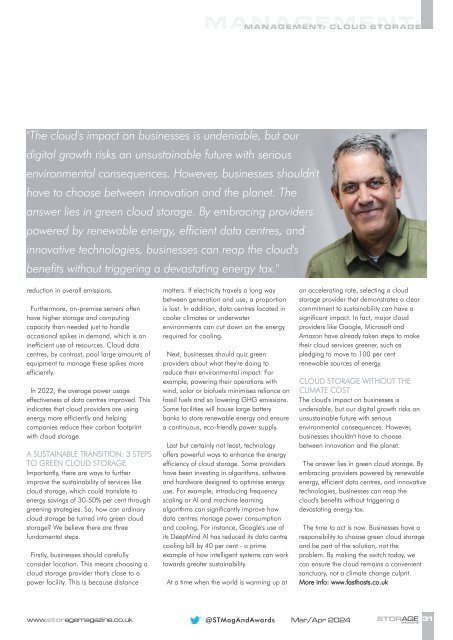ST2403
Create successful ePaper yourself
Turn your PDF publications into a flip-book with our unique Google optimized e-Paper software.
MANAGEMENT: CLOUD STORAGE<br />
"The cloud's impact on businesses is undeniable, but our<br />
digital growth risks an unsustainable future with serious<br />
environmental consequences. However, businesses shouldn't<br />
have to choose between innovation and the planet. The<br />
answer lies in green cloud storage. By embracing providers<br />
powered by renewable energy, efficient data centres, and<br />
innovative technologies, businesses can reap the cloud's<br />
benefits without triggering a devastating energy tax."<br />
reduction in overall emissions.<br />
Furthermore, on-premise servers often<br />
have higher storage and computing<br />
capacity than needed just to handle<br />
occasional spikes in demand, which is an<br />
inefficient use of resources. Cloud data<br />
centres, by contrast, pool large amounts of<br />
equipment to manage these spikes more<br />
efficiently.<br />
In 2022, the average power usage<br />
effectiveness of data centres improved. This<br />
indicates that cloud providers are using<br />
energy more efficiently and helping<br />
companies reduce their carbon footprint<br />
with cloud storage.<br />
A SUSTAINABLE TRANSITION: 3 STEPS<br />
TO GREEN CLOUD STORAGE<br />
Importantly, there are ways to further<br />
improve the sustainability of services like<br />
cloud storage, which could translate to<br />
energy savings of 30-50% per cent through<br />
greening strategies. So, how can ordinary<br />
cloud storage be turned into green cloud<br />
storage? We believe there are three<br />
fundamental steps.<br />
Firstly, businesses should carefully<br />
consider location. This means choosing a<br />
cloud storage provider that's close to a<br />
power facility. This is because distance<br />
matters. If electricity travels a long way<br />
between generation and use, a proportion<br />
is lost. In addition, data centres located in<br />
cooler climates or underwater<br />
environments can cut down on the energy<br />
required for cooling.<br />
Next, businesses should quiz green<br />
providers about what they're doing to<br />
reduce their environmental impact. For<br />
example, powering their operations with<br />
wind, solar or biofuels minimises reliance on<br />
fossil fuels and so lowering GHG emissions.<br />
Some facilities will house large battery<br />
banks to store renewable energy and ensure<br />
a continuous, eco-friendly power supply.<br />
Last but certainly not least, technology<br />
offers powerful ways to enhance the energy<br />
efficiency of cloud storage. Some providers<br />
have been investing in algorithms, software<br />
and hardware designed to optimise energy<br />
use. For example, introducing frequency<br />
scaling or AI and machine learning<br />
algorithms can significantly improve how<br />
data centres manage power consumption<br />
and cooling. For instance, Google's use of<br />
its DeepMind AI has reduced its data centre<br />
cooling bill by 40 per cent - a prime<br />
example of how intelligent systems can work<br />
towards greater sustainability.<br />
At a time when the world is warming up at<br />
an accelerating rate, selecting a cloud<br />
storage provider that demonstrates a clear<br />
commitment to sustainability can have a<br />
significant impact. In fact, major cloud<br />
providers like Google, Microsoft and<br />
Amazon have already taken steps to make<br />
their cloud services greener, such as<br />
pledging to move to 100 per cent<br />
renewable sources of energy.<br />
CLOUD STORAGE WITHOUT THE<br />
CLIMATE COST<br />
The cloud's impact on businesses is<br />
undeniable, but our digital growth risks an<br />
unsustainable future with serious<br />
environmental consequences. However,<br />
businesses shouldn't have to choose<br />
between innovation and the planet.<br />
The answer lies in green cloud storage. By<br />
embracing providers powered by renewable<br />
energy, efficient data centres, and innovative<br />
technologies, businesses can reap the<br />
cloud's benefits without triggering a<br />
devastating energy tax.<br />
The time to act is now. Businesses have a<br />
responsibility to choose green cloud storage<br />
and be part of the solution, not the<br />
problem. By making the switch today, we<br />
can ensure the cloud remains a convenient<br />
sanctuary, not a climate change culprit.<br />
More info: www.fasthosts.co.uk<br />
www.storagemagazine.co.uk<br />
@STMagAndAwards Mar/Apr 2024<br />
STORAGE<br />
MAGAZINE<br />
31
















